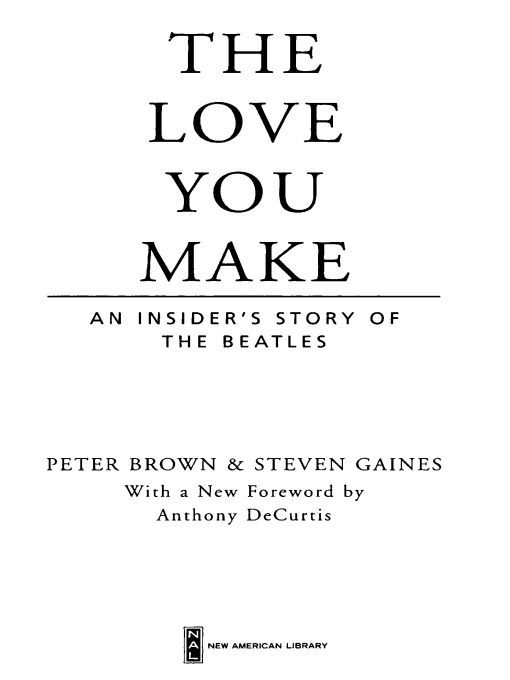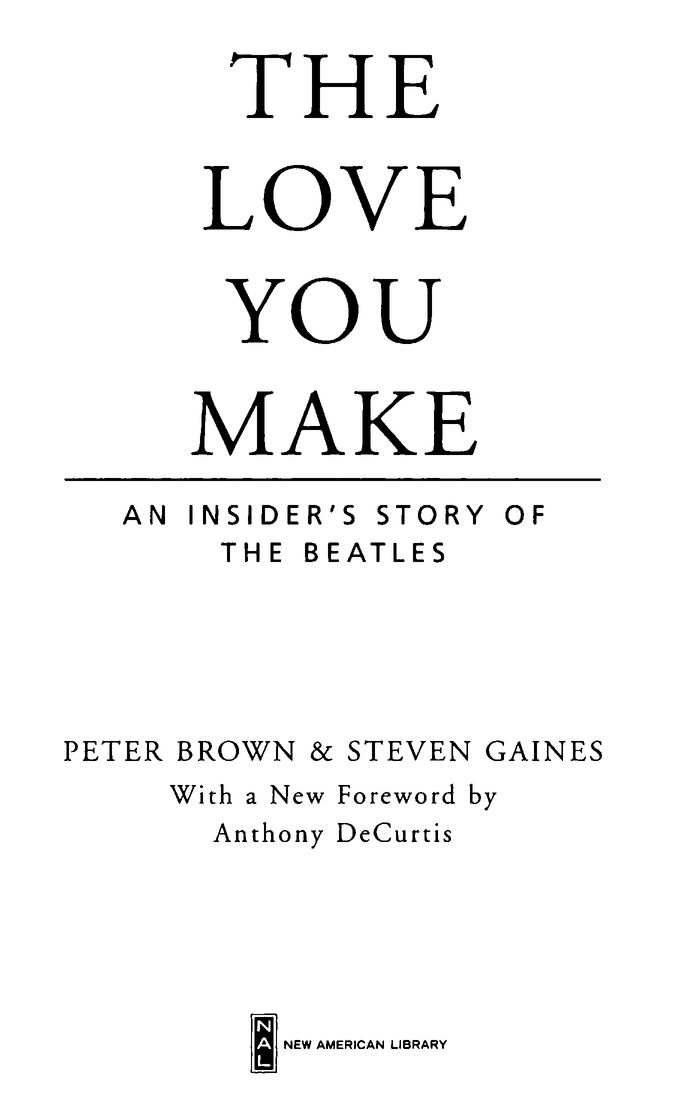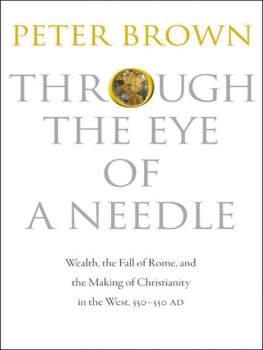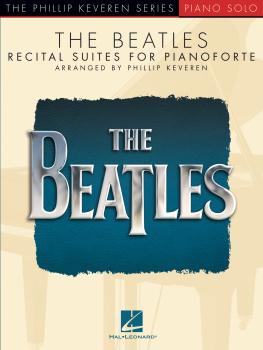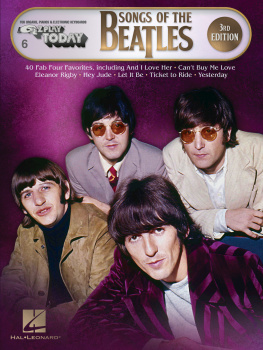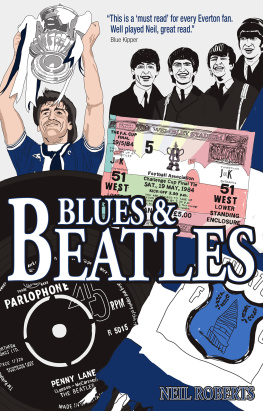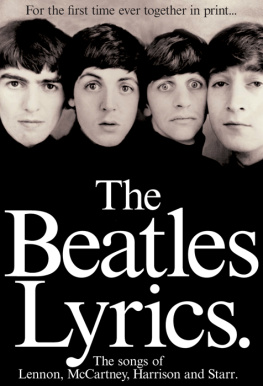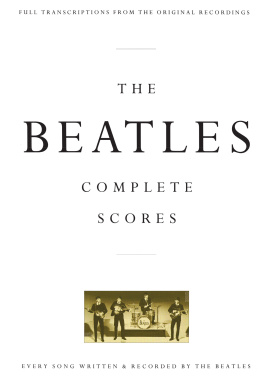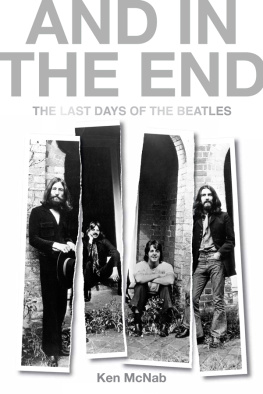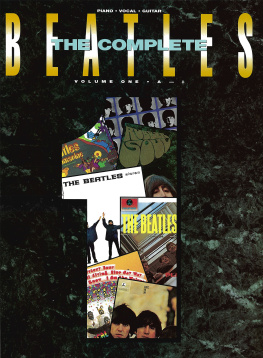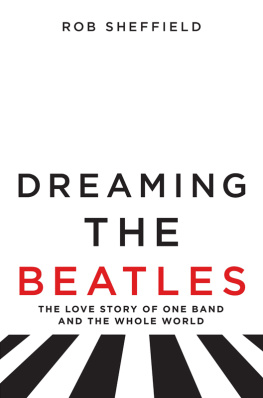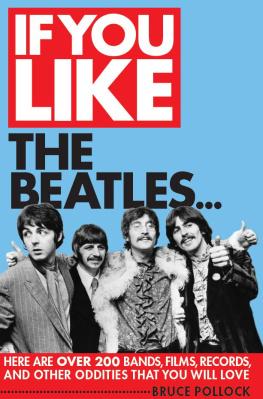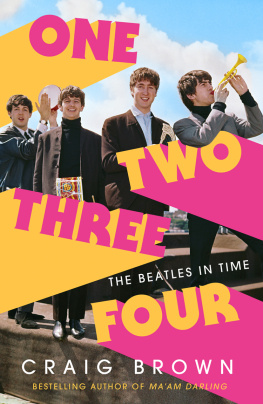Table of Contents
PRAISE FORTHE LOVE YOU MAKE
Finally, the real story ... it should sell forever.Rolling Stone
Beatles aficionados will be amazed by the wealth of detail, the questions answered, and the tale of what happened to the Beatles, their women, their children, and their friends.
Liz Smith, New York Daily News
Leaves the reader tearing through it as though one didnt know how the story ended.San Francisco Examiner
A gothic tale of drugs, sex, music, greed, booze, and genius ... an entire generations loss of innocence.People
Fascinating.The Indianapolis Star
The most sensational Beatles biography ... emotionally involving.
Esquire
The definitive book on the worlds greatest rock group ... tells the truth with surprisingly little varnish.Chicago Tribune
A dramatically good story.... Peter Brown catches us with the headiness of it all.Publishers Weekly
And in the end
The love you take
Is equal to the love
You make.
The last lyric in the last song
on the last Beatles album
foreword
Once There Was a Way to Get Back Homeward
I believe in Beatles, David Bowie sings at one point on his current album, Heathen. The line occurs in a song called Afraid, and it is the statement of a man who is struggling with nebulous fears that he cannot name. But I put my faith in tomorrow, the lyric runs, as the singer encourages himself, I believe were not alone/I believe in Beatles/I believe my little soul has grown/And Im still so afraid ... on my own.
Afraid could almost be a rewrite, more than thirty years later, of John Lennons God; the sentiment is the same, but its intentionally delivered by Bowie from a more cowardly perspective. God is the summary statement of Lennons first post-Beatles solo album, Plastic Ono Band. God begins with the lines, God is a concept by which we measure our pain, and as the song goes on, Lennon systematically sheds all the faiths that, in his view, only serve to provide people with an illusory protection against the dread isolation they feel in an uncaring universe. Jesus, Buddha, Elvis Presley, and Bob Dylan all take the fall before Lennon dramatically declares: I dont believe in Beatles/I just believe in me/Yoko and me/Thats reality.
Lennon, of course, was nearly driven mad by his time in the Beatles, and until the day of his death he could not speak of the band without a chill running down his spine about peoples expectations of him as a member of the group. In the first major interview he granted after the Beatles publicly broke up, Lennon blew the lid off what the Beatles lives were likeor at least what his own harrowing experience was like. I couldnt take it, Lennon told Jann S. Wenner, the editor of Rolling Stone, in 1970. It was awful. All that business was completely awful. It was a fuckin humiliation. One has to completely humiliate oneself to be what the Beatles were, and thats what I resent. I did it, but I didnt knowI didnt foresee thatit just happened bit by bit till this complete craziness is surrounding you. And youre doing exactly what you dont want to do with people you cant standthe people you hated when you were ten.
Ten years later, in one of the last interviews he ever did, Lennon had this to say about the desire on the part of fans for a Beatles reunion. And for the ones who want to relive it, Resurrect the Beatles and all, he told David Sheff, who was on assignment for Playboy, for those who didnt understand the Beatles and the sixties in the first place, what the fuck are we going to do for them now? Do we have to divide the fish and the loaves for the multitudes again? Do we have to get crucified again? Do we have to do the walking on water again because a whole pile of dummies didnt see it the first time or didnt believe it when they saw it? Thats what theyre asking: Get off the cross. I didnt understand it the first time. Can you do it again? No way!
You certainly can attribute some of passion of those remarks to Lennons vitriolic nature and his fondness for hyperbolenot to mention his megalomania. (He was given to Christ comparisons as early as his claim in 1966 that the Beatles were more popular than Jesus and his comic worry in the Beatles 1969 single The Ballad of John and Yoko that The way things are going/Theyre gonna crucify me.) But even the far less volatile George Harrison claimed near the end of The Beatles Anthology that the relationship between the band and their fans was a very one-sided love affair. The people gave their money and they gave their screams, but the Beatles gave their nervous systems, which is a much more difficult thing to give.
For Harrison the stress of being in the Beatles manifested itself as a fear of the external upheavals that often surrounded the bandand a fear of being assassinated. I wanted to stop touring after about 65, actually, because I was getting nervous, he told me when I interviewed him in 1987. I didnt like the idea of being too popular. There was that movie The Manchurian Candidate.... I think in history you can see that when people get too big, something like that can very easily happen. Although at the time it was prior to all this terrorism. I mean, we used to fly in and out of Beirut and all them places. I mean, you would never dream of going on tour now in some of the places we went....
We were flying into race riots in Chicago, he continued. We flew into this situation where the French and the English in Montreal were having a big fight, and Ringo was threatened.... It was nerve-racking. Everywhere we went, it was something like that. Wed go to Japan, where the students were rioting, and thered be Beatlemania all mixed up with the politics. It just seemed to be like that all the time. Harrisons fears for his personal safety might seem paranoidexcept, of course, that John Lennon was eventually murdered, and years later, Harrison was nearly stabbed to death in his own home.
For a variety of reasons, relatively little of the chaos afflicting the Beades lives was evident to anyone outside the bands small, tightly knit circle. While the Beatles were one of the phenomena that launched the age of worldwide mass communication, the media were not nearly as aggressive, intrusive, or powerful as they would become in the decades after the bands breakup in 1970. Even Lennon, Harrison, Paul McCartney, and Ringo Starrwho were easily among the most famous people on the planetwere accorded a degree of privacy that would make them seem absolutely reclusive by contemporary standards. Or, should I say, lack of standards.
In addition, the Beatles often kept their own counsel, even in the worst of times. In the early days, the cohesion among the band members constituted a kind of us-against-the-world toughness. It was the self-protective stance of four Liverpool lads contending with forces outside themselves whose strength and strangeness they could not have imagined only a short time before. Harrison once summarized the Beatles touring entourage to me as only two road managers, thats what we had. One guy to look after our equipmentwhich was three little amplifiers, three guitars, and a set of drumsand one guy who looked after us and our suits.

